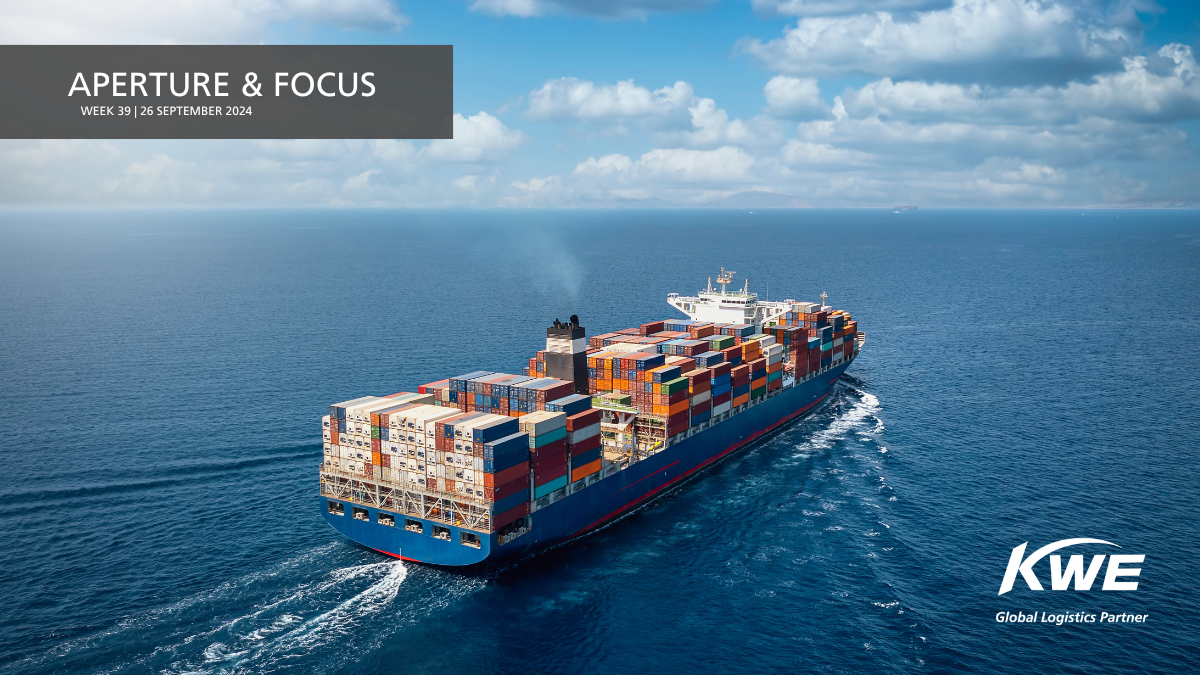Quote
Aperture & Focus 2024: Week 39

Global Aperture
At the 79th United Nations General Assembly, maritime business leaders and cargo owners issued a joint statement urging immediate action on maritime decarbonization, calling for a global regulatory framework to accelerate the adoption of zero and near-zero Greenhouse Gas (GHG) fuels. INTERCARGO, the International Association of Dry Cargo Shipowners, which represents companies involved in transporting dry bulk commodities, also endorsed the IMO's mid-term GHG reduction strategy, emphasizing practical solutions to balance environmental responsibility with operational efficiency.
The global air cargo industry is anticipating its strongest peak season ever, driven by surging e-commerce, with experts warning of potential disruptions for shippers. Despite a significant rise in demand, capacity constraints are pushing freighter fleets and key routes to operate near full capacity.
Disruptions in the Red Sea, particularly from Houthi attacks, led to a decline in connectivity for several Eastern Mediterranean ports, including Alexandria, Piraeus, Ashdod, and Mersin, despite stable container traffic through the Suez Canal. While some ports showed modest increases in connectivity, the region overall experienced a downturn, highlighting the broader impact of regional instability on maritime trade.
Regional Focus
Americas
United States: Southern California's largest ports, Long Beach and Los Angeles, reported an increase in cargo volumes in August, driven by strong consumer sales, a positive economy, and cargo diversions. Port officials anticipate continued growth through the peak season, with Long Beach experiencing its busiest month ever and Los Angeles nearing its capacity.
With a potential US East and Gulf Coast port strike imminent, carriers have begun implementing contingency plans, including halting inland cargo movements and announcing congestion-related surcharges. The Port of New York-New Jersey has urged shippers to prioritize the removal of cargo by September 30th, warning that refrigerated and hazardous materials will not be monitored during the strike. Terminals will extend gate hours, but train services will stop by Monday, and the port’s Truck Service Center will be closed for the duration of the stoppage.
Canada: On September 24th, grain workers at Canada’s largest port went on strike over pay and hours, disrupting grain exports during the critical harvest season. The strike, which affects major terminals in Vancouver, could halt the shipment of about 100,000 metric tons of grain daily. The stoppage is especially impactful as Vancouver handles over half of Canada’s grain exports, and with limited alternate routes available, supply chain disruptions are extending beyond the port itself.
Asia-Pacific
Japan: On September 22nd, 2024, record rainfall in Ishikawa prefecture, Japan, caused deadly flooding and landslides, leading to at least six deaths and widespread evacuations, disrupting local industries. The severe weather halted restoration work from the New Year’s Day earthquake, impacted supply chains, and caused power outages to over 6,200 households, including key infrastructure sites, hindering industrial operations and recovery efforts.
Australia: Australia will introduce stricter air cargo security measures for shipments from 55 European and CIS (Commonwealth of Independent States) countries on September 26th, requiring cargo on passenger planes to come from shippers with an Established Business Relationship (EBR). The suddenness and complexity of these new regulations, which align with similar measures in the US and Canada, have raised concerns about operational complexities, particularly for smaller shippers, and the uneven application of these new regulations across carriers.
Europe, Middle East & Africa
Italy: Heavy rains and floods in Italy have forced the closure of key sections of the Adriatic rail line until September 30th, leaving the port of Ravenna inaccessible. The region of Emilia-Romagna, where the port is located, has been severely affected, with rail traffic halted in multiple areas.
Netherlands: Schiphol Airport is introducing the Secure Import system to enhance cargo security by limiting access to sensitive shipment information and ensuring only verified parties can collect cargo using a secure e-Visit key. This new process aims to reduce crime and improve operational efficiency in air cargo handling.
South Africa: According to KWE sources South African ports faced significant delays and operational challenges due to adverse weather, reduced berth capacity, and inefficiencies at Transnet, the state-owned company in South Africa responsible for freight transport and logistics, managing rail, ports, and pipelines, impacting shipping schedules. These disruptions, including severe congestion in Durban and slower operations in Coega and Cape Town, are causing prolonged vessel wait times and logistical challenges, further straining the supply chain and increasing costs for the industry.